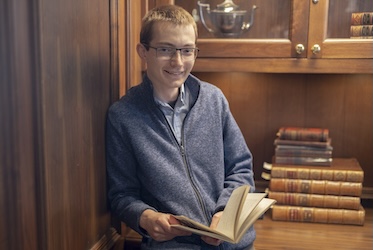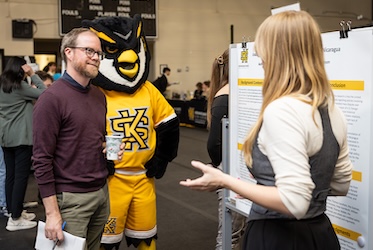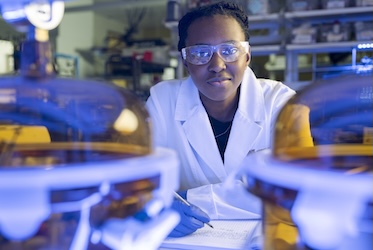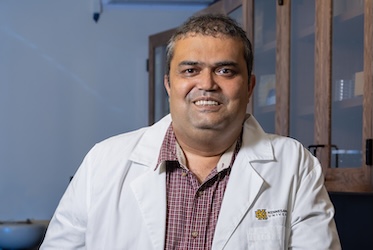
Kennesaw State undergraduate researcher tackles end-of-life communication
KENNESAW, Ga. | Oct 23, 2024

A KSU Journey Honors College student from Cartersville, Georgia, Smith has focused on end-of-life communication through the university’s First-Year Scholars Program. The research is deeply personal, because she has experienced end-of-life communication with her grandmother.
Smith recalled recently how her grandmother, who had progressive supranuclear palsy, a condition similar to Parkinson’s disease, was unable to speak by the time of her death in the fall of 2022.
“I was talking to her, not knowing if she could hear me,” Smith said. “Then, she squeezed my hand. That small gesture gave me closure. Some people never get that experience, so I always tell people to say what they need to while they still can.”
Smith explained that her research focused on how these end-of-life conversations affect self-esteem and provide closure, not only with the parent but the supportive partner during the grieving process.
Smith’s findings from her research collected by anonymous online surveys show that these tough conversations can boost self-esteem, something she experienced firsthand when fulfilling her grandmother’s last wish – to have her granddaughter speak and sing at her funeral. She credits the moment she was able to do both as the catalyst for her newfound confidence and willingness to try new things.
Smith’s passion for research was ignited through the First-Year Scholars Program, which got underway around the same time as her grandmother’s death.
“I applied to the program the exact day my grandmother passed away,” Smith said. “I decided to honor her legacy through this research. It wasn’t just about being in a lab—it was about connecting with real-life experiences.”
Her mentor, associate professor of communications Emily Scheinfeld, guided her along the way.
“My colleagues and I were excited to have a first-year student on our project about final conversations,” Scheinfeld said. “Undergraduate students bring a level of innovation and that “out-of-the-box thinking” that sometimes we forget how to do ourselves. So, when tasked with writing her own research questions, Ella stepped up and was thoughtful about outcomes, like relational satisfaction and self-esteem, that provided a new way of looking at the same old variables.”
Smith has presented her research at national conferences with her mentor guiding her. Scheinfeld’s end-of-life communication research was inspired by her late mother. Together, they discovered a special coincidence: both Scheinfeld’s mother and Smith’s grandmother shared the name, Jane, a detail that made Smith’s work even more meaningful.
“It has been a joy to be able to mentor Ella as she moved through the various aspects of academic research, and navigate presentations, posters, conferences, and now submitting to an academic journal,” Scheinfeld said.
The project has been a therapeutic experience for Smith, whose newfound passion for research has led to her understanding the importance of scientific inquiry, to make informed decisions and using the knowledge for something meaningful.
"My research not only helped me understand these themes but also helped me connect with older generations on a deeper level,” Smith said. “The baby boomer generation is experiencing so much loss, and having the right tools to navigate end-of-life conversations is crucial."
– Story by Darius Goodman
Photos by Matt Yung
Related Stories

First-year Kennesaw State student, author recognized as versed local historian

Kennesaw State students to present research at Symposium of Student Scholars

Chemistry student engaged in sustainable catalyst research through Kennesaw State's First-Year Scholars program

Kennesaw State researchers awarded Department of Energy grant to investigate materials that boost energy-efficient technologies
A leader in innovative teaching and learning, Kennesaw State University offers undergraduate, graduate, and doctoral degrees to its more than 47,000 students. Kennesaw State is a member of the University System of Georgia with 11 academic colleges. The university’s vibrant campus culture, diverse population, strong global ties, and entrepreneurial spirit draw students from throughout the country and the world. Kennesaw State is a Carnegie-designated doctoral research institution (R2), placing it among an elite group of only 8 percent of U.S. colleges and universities with an R1 or R2 status. For more information, visit kennesaw.edu.














